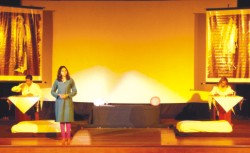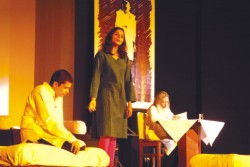|
Theatre
Conversation Gurudev and the Mahatma
Elita Karim
 |
The Bangalore Little Theatre presenting 'The Mystic and the Poet.' photo: Zahedul I Khan |
“The arrogance of the walls!” screams Abhijit Ganguly, playing the part of Rabindranath Tagore, while delivering out parts of the letters written by Tagore to Gandhi, describing Tagore's visit to the jail to meet Gandhi. Gandhi, played by Sanjeev Iyer, was weak with no nourishment of any kind for days together, protesting against the British government with a hunger strike. As more of the letters unfolded in the play, memories from old history school books and classes were flashing before everyone, when Gandhi and Tagore came together on stage last week, first at the Gulshan Club and the very next day in the auditorium of the International School of Dhaka.
The Bangalore Little Theatre (BLT), founded by Vijay Padaki, staged their latest play The Mystic and the Poet, which is based on a compilation of letters and articles exchanged between Mohandas Karamchand Gandhi and Rabindranath Tagore. The exchange, which happened over a span of 25 years, reflects on both Tagore and Gandhi's take on the various phases of attaining swaraj or independence in India. The letters disclose how the two differed in their opinions, in terms of building and supporting policies, the form and the content of the freedom movement. Presented by Renata Limited, the 90-minute drama was organised by Excaibur Entertainment & Jatrik and co-sponsored by Securex. The last show was staged on May 8, 2010, Tagore's 149th birth anniversary.
The exchange between the three actors on stage was not only informative, but also powerful and enlightening. Showcasing the strong stances that each of the personalities held on to for decades, the exchange also revealed the disagreements and the misunderstandings that would sometimes occur between the two. There was an instance when Gandhiji would try to persuade the Gurudev to join his non-violent movement, as Tagore too, in his own ways, worked towards Swaraj. However, Tagore would not budge and preferred to work on his own. “Songs I can spin, poems I can spin, but what a mess I would make of your cotton, Mahatma!” exclaimed Tagore, when he was asked to play a significant role in encouraging the Charkha movement.
 |
A part of the exchange. Photo: Zahedul I Khan |
Gandhiji's effort to boycott everything British was beautifully displayed through the letters that were interpreted and enacted on stage. One could easily imagine the famous Dandi March or the Salt March led by the Mahatma and followed by thousands. One could also feel the pain and the helplessness of those who were scrambling towards life, when shot dead at the Jalianwala Bagh incident. Gandhiji wanted to retaliate by making an appeal to all to start boycotting everything British, including education and getting into local schools instead. Gurudev Tagore was doubtful, however, regarding boycotting schools and how much the local schools could actually provide the young students.
However, nothing could deny the fact that each held the other in great respect. After all, both the people's poet and leader had one aspect in common-- to liberate their people from the clutches of the British, to educate the masses and make them self-reliant. After all, the entire exchange had taken place with the Indian freedom struggle as the backdrop.
Narrated by Aparna Nori, the script was developed from a manuscript written by the Tagore scholar-translator Shailesh Parekh. The manuscript is based on the research done by the former Vice Chancellor of Visva Bharati University, Sabyasachi Bhattacharya. The Bangalore Little Theatre is quite well known in South India and has a strong reputation in translations and adaptations, and has been promoting play-writing activities since the seventies.
Copyright
(R) thedailystar.net 2010
|

